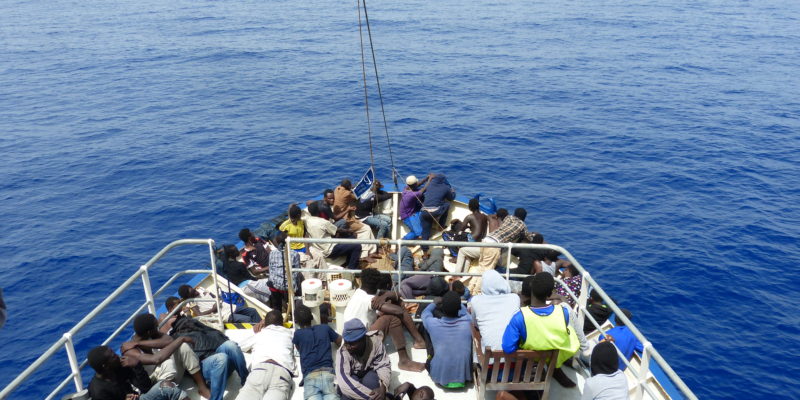1. Migration myths dominate Italian the election campaign – while new studies suggest that NGOs are not a pull factor for immigrants
Immigration is now the biggest issue for 36% of Italians (up from just 3% in 2012, writes Stefano Torelli, a researcher with ISPI, on the website of the European Council on Foreign Relations. Another ISPI researcher, Matteo Villa, teased a soon to be published study, arguing that the NGOs have no influence over migrant boats leaving. “The data shows that between 2015 and now, NGO activities did not serve as a pull factor, and were not correlated with a surge in migrant flows. Whether or not the NGOs were operating at sea, migrant flows were not influenced,” Villa said, in an article by Annalisa Camilli.
NGOs and #migrant sea arrivals to #Italy: time for an update! Now that 2017 data is fully in, we can definitely show that NGOs' search and rescue operations did NOT act as a pull factor for arrivals (nor, surely, did they deter them). Crucial evidence for an informed debate. 👇 pic.twitter.com/Isgtba0a5h
— Matteo Villa (@emmevilla) February 20, 2018
2. Libya’s triangle of tragedy
People in Libya are still fleeing violence. Departures and rescue operations at sea are an everyday occurrence, with more and more Libyans joining those who attempt to reach Europe. However, Italy insists on calling Libya a safe country, where migrants can be sent back or held. This attitude seems to be mirrored by Frontex: “And for now [Italy] is going in the right direction, even though the conditions of the centres in Libya are not in line with our standards, and with basic humanitarian standards”, said Fabrice Leggeri, Director of the European border control agency.
3. Illegal border crossing and shorter asylum application windows: the limits of Macron’s liberalism
Activists, experts and pundits are accusing Macron of having shown his true political colours through his tough proposals to crack down on immigration and asylum in France. According to Il Post, the bill will criminalise illegal border crossing and reduce the consideration period for asylum applications. As such, it has drawn complaints from human rights groups, and even by some majority deputies. The Guardian has also criticised the reform: according to the British newspaper, “you can’t lead the world into a liberal era while punishing refugees at home”.
4. The UK is no longer an Eldorado for EU citizens
According to the Office for National Statistics, 130,000 EU citizens living in the UK left the country between January and September 2017: to find comparable figures, one needs to look back 10 years. According to the Guardian, the data suggests that the uncertainty created by Brexit is outweighing the UK’s reputation as the “jobs factory of Europe”. Meanwhile, the Home Office is under pressure to stop deporting Afghan asylum seekers.
5. EU development funds for Africa are not working as planned
An increasingly common justification for European development assistance to Africa is the notion that it will reduce migration from the South. While this sounds intuitive and makes for an appealing argument, it is also very unlikely. Irin News has focused on the case of Sudan: without addressing the root causes of migration, only corrupt government officials and traffickers are benefiting from criminalising migrants. Also read our own in-depth article on the EU Emergency Trust Fund for Africa.
6. Xenophobia and racism: human rights defenders are under attack
In his new report, the UN Special Rapporteur on the situation of human right defenders has spoken out against the attacks on those who are defending people on the move. According to Forst, one of the main reasons for the attacks against the defenders of the rights of people on the move is the global rise of xenophobia and racism.
7. Is the USA still a nation of immigrants?
As the Trump administration pursues its crackdown on immigration, the US Citizenship and Immigration Services intend to remove “nation of immigrants” from their mission statement.
8. Migrations in Italy, between successful integration experiments and the “pocket money” scandals
A non-profit in Giugliano, Campania, has been accused of embezzling funds for migrants – both the daily 35-euro bonus for reception services and the “pocket money” given to cover the refugees’ expenses. Meanwhile, the medieval town of Castellina in Chianti in Tuscany is born again thanks to immigrants and their children. Writing for the New York Times, Gaia Pianigiani tells how the successful integration in the Tuscan town can serve as an example for all of Italy.
9. Bardonecchia, the last frontier
The Piedmont ski resort of Bardonecchia, near the French border, has witnessed a surge in the number of migrants heading to France. Read this article in Melting Pot on how many migrants are braving the cold and the patrols in the attempt to reach the French village of Nevache. Also in Bardonecchia, on the route to Briançon, Lorenzo Sassi and Emanuele Amighetti had reported for Open Migration on the migrants passing through and the locals who are trying to help them.
10. Australia is still detaining refugees on Manus Island
The mandatory relocation to Papua New Guinea of refugees formerly detained by Australia at the offshore camp on Manus Island is not going as planned. Radio New Zealand has covered the situation in a three-part report:
- Manus refugees fail to resettle in PNG
- PNG resettlement impossible for Manus refugees
- More refugees sent back to Manus Island.
Foto di copertina via BB (CC BY-NC 2.0)









